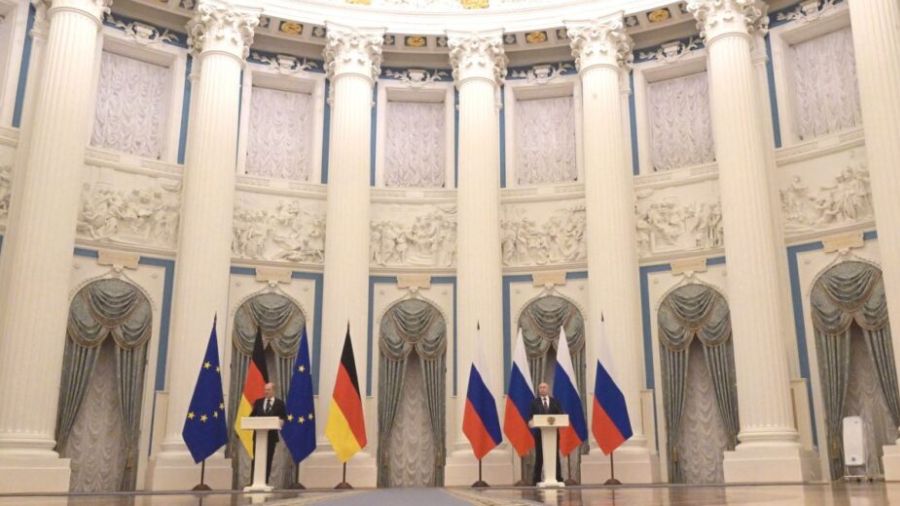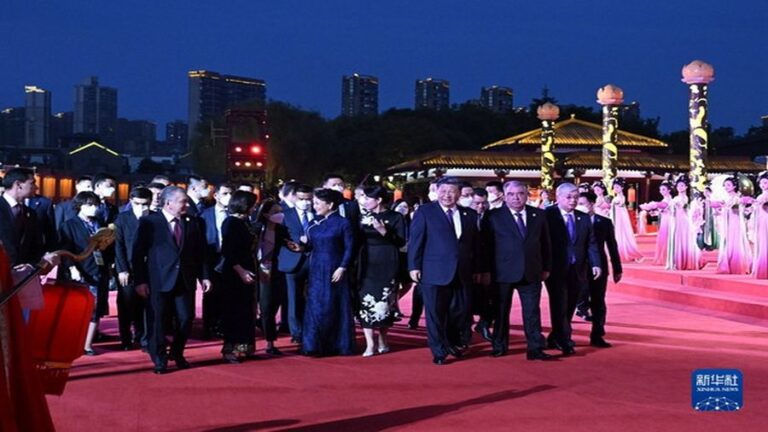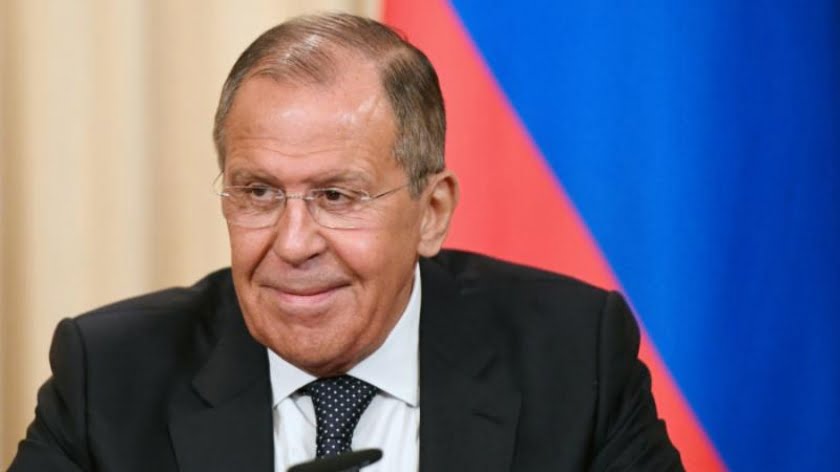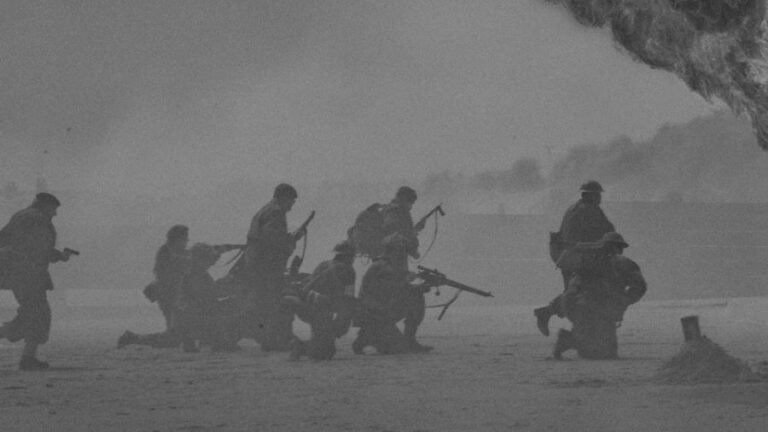From the Rapallo Treaty to War in Ukraine: The Western Policy Towards Moscow-Berlin Relations
The Biden Administration has been using the political, social, and ethnic contradictions inside Ukraine and the war itself to achieve many of his geopolitical objectives.
A century ago, on April 16th, Germany and the Soviet Union signed the Rapallo Treaty in Italy. After the First World War, in 1919, the Versailles Treaty had established a punitive peace against Germany. The victors: had redrawn German borders; had determined territorial reparations as part of the compensation for the damage caused; had forced Germany to renounce all its colonies and territories outside Europe; and, also, had demobilized and reduced its armed forces.
According to the famous article 231, known as the War Guilt Clause, Germany had to take responsibility for the conflict. Based on this article, one enforced war reparation debts, keeping the country for many years in a very vulnerable economic situation.
Two years later, during the Genoa Conference, in 1922, all the doors remained closed, despite several German efforts and attempts to renegotiate the heavy financial burdens. None wished to reopen diplomatic dialogues at the risk of providing the opportunity to Germany to act among the rivalries of winners to conquest advantages. Then, the unexpected happened. Since Germany and the Soviet Union already had common dissatisfactions, mainly due to the reestablishment of Poland between both after the First World War, the two most powerful countries on the continent accomplished in Rapallo something unforeseen.
In a radical change of its foreign policy, the German delegation accepted a Soviet proposal for a defensive alliance. Berlin and Moscow sought to re-establish diplomatic relations, renouncing mutual territorial and financial claims besides pursuing an economic rapprochement.
Since then, the stance of the victorious hardened significantly against Germany. In retaliation, just three weeks after the Genoa Conference, the committee of bankers, appointed by the War Reparations Commission, stated that German credit was not sufficiently high to justify an international loan. (1)
Blocking external financing, they transformed the German inflation problem into never-before-seen hyperinflation. The German authorities lost control over exchange rates due to the foreign currency shortage. Strange as it may seem, the origins of German hyperinflation lie more in foreign policy than in the economic measures of the then government of the Weimar Republic.
Furthermore, eight weeks after Rapallo, perhaps not coincidentally, the German Foreign Minister Walther Rathenau, who had been in charge of negotiations with the Soviets, was assassinated in Berlin. At last, on January 11th, another also aggressive retaliation took the form of territorial conquest. France and Belgium invaded the industrial region of the Ruhr Valley without consulting the other allies.
It was within the new administration led by Stresemann, the Chancellor of the Weimar Republic since the second half of 1923 and later Minister of Foreign Affairs from 1923 to 1929, that Germany abandoned the confrontation policy of Rapallo. Beyond the aggressions of the victorious, German economic weakness, severely aggravated by the retaliations, pushed the country against the Soviet Union since the latter had not offered it many concrete economic advantages. In the end, Western countries achieved what they had been looking for: set Berlin apart from Moscow.
This outcome followed closely one of the main principles of the famous British geographer Alfred Mackinder, drafted in his 1904 classical article, The Geographical Pivot of History. According to Mackinder, in the clash between territorial and maritime powers, it is more favorable for the territorial ones to launch themselves into the ocean from their continental base than for the maritime ones to project into the land from their island base. And, in the context of a Berlin-Moscow alliance, for instance, Germany could be an oceanfront to the continental power of Russia, shaping a block of countries that could become an amphibious power threatening the consolidated maritime power, the United Kingdom. So, the British foreign policy would have to undertake all the necessary efforts to maintain Berlin and Moscow in opposite geopolitical fields. In his own words: “The oversetting of the balance of power in favor of the pivot state [Russia], resulting in its expansion over the marginal lands of Euro-Asia, would permit of the use of vast continental resources for fleet-building, and the empire of the world would then be in sight. This might happen if Germany were to ally herself with Russia.” (2)
It did not take long for a similar challenge to reappear at the Institute of Geopolitics in Munich, coordinated by Karl Haushofer. The general and geographer identified the United Kingdom as the main threat to German security, defended, in effect, a rapprochement with Russia, even communists, as well as with Japan, for the setting-up of a broad Eurasian axis of opposition to the British naval, its global strategic positions, and its colonialism. (4)
From this point of view, it should not have surprised a more passive position, particularly by England, concerning the rise of the Nazi party and the initiatives of Hitler throughout the 1930s. As briefly pointed out by Kissinger: “(…) in the eyes of many British and French leaders, Hitler’s truculent foreign policy was more than counterbalanced by his staunch anti-communism (…).” (4)
For the English authorities, it suited the consolidation of a government with a hard anti-communist bias, directly antagonizing Moscow. Furthermore, they were deeply more interested in a German vision distinct from the approach debated at the Munich Institute, aiming ultimately to redirect German geopolitical concerns from London into Moscow. Luckily for England, the power policy of Adolf Hitler diverged from the geopolitical view suggested by Haushofer. Based on an expansion towards the east, over regions rich in food and other natural resources, mainly oil, therefore antagonistic to Russia, Hitler aimed to consolidate the idea of German living space and build the imperial project of the Third Reich up.
As difficult as it may be for Anglo-Saxon analysts to address this fact, there was a continentalist and anti-oceanic conception in the expansionist policy of Hitler that better fit the interests of England. The anti-Russian character converged with the tradition of British imperial policy carried out since 1815, later theoretically framed by Mackinder in 1904. In short, the rise of Hitler meant a defeat within Germany of the geopolitical vision of Haushofer.
However, in August 1939, the Molotov-Ribbentrop pact of non-aggression between Germany and the USSR constituted a nightmare for British interests. For a moment, such events created a feeling of a grave mistake among western countries, mainly considering they had not fought back against the attacks of Hitler to the terms of the Versailles agreements throughout the nineteen-thirties.
Then, a new turnaround took place. The centrality of natural resources in the dynamics of the war, above all oil, pushed Hitler eastwards towards the Caucasus, to British relief, when he started the invasion of Soviet territory with the beginning of the Barbarossa operation in June 1941. For the second time since the First World War, Western countries achieved what they had been pursuing: set Berlin apart from Moscow.
Throughout the Cold War (1947-91), despite the partition of Germany and its capital, Berlin, Russian-German relations continued as a priority objective of the foreign policy of the western powers. Something expressed by the new military alliance, NATO, created in 1949, whose key purposes were to keep “the Soviet Union out [of Europe], the Americans in, and the Germans down”, according to its first secretary (1952-57), diplomat and general Lord Ismay. (5)
Indeed, NATO became the principal part of the power structure on which, during the entire period of the Cold War, Western countries, mainly the United States, got, once more, what they had been going after: set Berlin apart from Moscow.
Even after the end of the Cold War in 1991, the core NATO goals have not almost changed until today. Besides the 1991 United States National Security Strategy reinforced them in practice, they became more evident due to expressive and recent NATO expansion. (6)
In the last thirty years, fifteen new members joined the organization: Poland, the Czech Republic, and Hungary in 1999; Bulgaria, Estonia, Latvia, Lithuania, Romania, Slovakia, and Slovenia in 2004; Albania and Croatia in 2009; Montenegro, in 2017; and, finally, North Macedonia in 2020. It is worth highlighting the entry of the Baltic countries that used to belong to the USSR, Estonia, Latvia, and Lithuania. The distance from the Russia-Latvian border to Moscow is only 580 km, and the distance from the Russia-Estonia border to St. Petersburg is still smaller, 130 km.
However, despite all these former and recent western efforts to block Berlin-Moscow, the building of natural gas pipeline systems connecting Russia and Germany escaped the control at least until 2022. The Nord Stream 1 is a natural gas pipeline system running under the Baltic Sea. With 1,222 km (759 mi) in length, it is the longest sub-sea pipeline in the world. The Nord Stream 1 can transport 55 billion cubic meters of gas for at least 50 years. It has been operating since 2012. That year, it started the project to build two additional lines to double the annual capacity up to 110 billion cubic meters of gas, the Nord Stream 2. (7)
The pipeline systems connecting Russia and Germany might resolve the german and European problem of insecurity energy for a long time, despite increasing its dependency on Russia. However, Germany and Europe do not have many other economically viable alternatives in the short and medium terms. In addition to it, the project can enable the desired process of changing the German energy matrix by replacing nuclear reactors and coal plants with natural gas pipelines.
Russia, in turn, does not depend on selling natural gas to Europe to ensure its economic development neither in the short term nor in the long. The country has been building other partnerships up in Asia, mainly with China. Its strategic appraisal concerning Europe seems to be different. The energy agreement with the principal national economy of Europe, benefiting other continent countries, could have contributed to reducing the anti-Russia behavior, resulting in cooling down the Western pressure against Moscow. From a broader perspective, for both countries, the pipeline systems of the Nord Stream could have also helped the process of Eurasian integration, reinforcing the change of the European dynamic axis from the Atlantic to the east.
Nonetheless, Washington has not watched these initiatives unmoved. Unlike, the United States has opposed the project for a long time. Anyway, president Biden, on February 7th, 2022, took a critical step in a meeting with German chancellor Olaf Scholz at the White House, associating the Nord Stream 2 with the then growing tensions on the border between Ukraine and Russia. According to him, “if Russia invades, that means tanks or troops crossing the border of Ukraine, there will be no longer Nord Stream 2. We will bring an end to it.” In sequence, the reporter asked: “how will do that exactly since the control of the project is within German control?” And he answered: “I promise you we will be able to do it.” (8)
The statement is mainly a threat to Germany. The suspension of the Nord Stream 2 restores the German energetic insecurity problem, a not easy one to solve. On the other hand, despite having some accounting losses, the Russian economy does not depend on Nord Stream. And Washington knows it. Despite saying otherwise, the principal intention is not so much to economically damage Russia. What explains the connection between the Ukraine War and Nord Stream 2 is the possibility to set Berlin apart from Moscow again, for the fourth time since Versailles Treaty. (9)
All in all, Biden Administration has been using the political, social, and ethnic contradictions inside Ukraine and the war itself to achieve many of his geopolitical objectives; one of them is keeping the secular western interdiction in the relations between Berlin-Moscow. In that sense, they have been successful.
The lack of reaction of Chancellor Scholz in the meeting was embarrassing. In front of him and the world, Biden announced that he would interfere in German sovereign matters. That sounds strange for one of the most developed countries in the world. At last, what remains for the German authorities is to pretend that the suspension of Nord Stream 2 suits the higher national strategic interests.
Sergey Lavrov, the Russian minister of foreign affairs, synthesized well the situation when he affirmed that Washington is deciding “what is best for Europe”. According to him, “The European Union has been shown its place. The Nord Stream 2 story has shown perfectly the real place that the EU has on the world stage.” (10)
Only a relation with considerable power asymmetry between different territories may explain these sorts of enforcement, such as in the cases of colonies or occupied countries. One should not forget that the United States has got about 750 military bases beyond its borders. More than one hundred of them, just in Germany. (11) Actually, such fact helps to realize the scene in the White House and the compromise of the American authorities with the secular principle of the British geographer into keeping Berlin apart from Moscow.
References:
(1) Kindleberger, C. P. A Financial History of Western Europe. Oxford University Press, 1993. (p. 293).
(2) Mackinder, H. J. The Geographical Pivot of History. The Geographical Journal, London, April 1904. (p. 463).
(3) For more details about the antagonisms and connexions between the Mackinder and Haushofer thesis, or the divergence between the power of policy of Hitler and geopolitics of Haushofer, see: or Hans W. Weigert. Generals and Geographers: The Twilight of Geopolitics, published in 1942; or Leonel Itaussu Almeida Mello, Who is afraid of geopolitics?, Published in 2015.
(4) Kissinger, H. Diplomacy. Simon & Schuster, New York, 1994. (p. 294).
(5) See: https://www.nato.int/cps/en/natohq/declassified_137930.htm
(6) See: https://nssarchive.us/national-security-strategy-1991/
(7) See: https://www.nord-stream.com/the-project/pipeline/
(8) See: https://www.youtube.com/watch?v=OS4O8rGRLf8
(9) For an interesting article about this matter, see https://www.eurasiareview.com/16022022-the-crisis-in-ukraine-is-not-about-ukraine-its-about-germany-oped/
(10) See: https://www.rt.com/news/551148-napoleon-hitler-lavrov-interview/
(11) Vine, D. The United States of War. University California Press, 2020. (p. 5).







